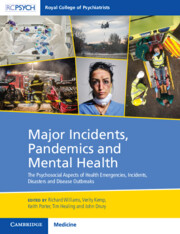 Major Incidents, Pandemics and Mental Health
Major Incidents, Pandemics and Mental Health from Section 5 - Sustaining and Caring for Staff During Emergencies
Published online by Cambridge University Press: 11 January 2024
Since the World Health Organization (WHO) declared a pandemic on 11 March 2020, there has been much research examining the effects of working during COVID-19 on different sectors of the healthcare workforce. This chapter explores the detailed narratives of nurses’ experiences of COVID-19 in the ICON qualitative research. The participants were from a wide range of working environments and were asked about the possible impacts of working during the pandemic on their psychosocial and emotional wellbeing. It concludes that nurses provided the most care 24 hours a day/7 days a week for patients during the COVID-19 pandemic. The study showed that nurses continued to put patients’ needs first, often to the detriment of their own health. It outlines valuable lessons in the form of structural, organizational, and team learning to support psychosocial wellness in emergencies and disease outbreaks such as the COVID-19 pandemic.
To save this book to your Kindle, first ensure [email protected] is added to your Approved Personal Document E-mail List under your Personal Document Settings on the Manage Your Content and Devices page of your Amazon account. Then enter the ‘name’ part of your Kindle email address below. Find out more about saving to your Kindle.
Note you can select to save to either the @free.kindle.com or @kindle.com variations. ‘@free.kindle.com’ emails are free but can only be saved to your device when it is connected to wi-fi. ‘@kindle.com’ emails can be delivered even when you are not connected to wi-fi, but note that service fees apply.
Find out more about the Kindle Personal Document Service.
To save content items to your account, please confirm that you agree to abide by our usage policies. If this is the first time you use this feature, you will be asked to authorise Cambridge Core to connect with your account. Find out more about saving content to Dropbox.
To save content items to your account, please confirm that you agree to abide by our usage policies. If this is the first time you use this feature, you will be asked to authorise Cambridge Core to connect with your account. Find out more about saving content to Google Drive.